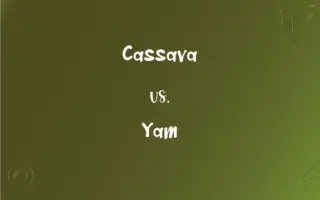Scolding vs. Abuse: What's the Difference?
Edited by Aimie Carlson || By Janet White || Updated on October 5, 2023
Scolding refers to a harsh or sharp reprimand, while abuse is the improper treatment or misuse of someone or something, often causing harm or injury.

Key Differences
Scolding and abuse, while often interconnected, have distinct connotations. Scolding denotes the act of reprimanding or chastising someone, typically for a specific behavior or action. It's usually verbal and aims to correct or admonish. Parents might resort to scolding when their children misbehave, emphasizing the wrongness of the action and guiding them toward better behavior.
Conversely, abuse is a broader term that encompasses the maltreatment, misuse, or excessive use of someone or something. Abuse can manifest in many forms, such as physical, verbal, emotional, or even substance abuse. Unlike scolding, which may be momentary and corrective, abuse tends to be recurring and can result in lasting harm, trauma, or damage.
Moreover, it's crucial to understand that while scolding can be a form of verbal abuse if excessive or demeaning, not all scolding equates to abuse. Teachers might scold students to maintain classroom discipline without it being abusive. However, a pattern of consistent, degrading scolding could be labeled as abusive.
Abuse, with its wider range of manifestations, carries more severe consequences. It can lead to lasting psychological or physical scars, whereas a singular instance of scolding might result in momentary upset but not prolonged harm. Still, context matters, and the impact of both scolding and abuse varies depending on the individual and the circumstances.
Comparison Chart
Grammatical Role
Noun (usually referring to verbal reprimand)
Noun (refers to harmful treatment or misuse)
ADVERTISEMENT
Intensity
Generally less intense
Can be intense and cause lasting harm
Duration and Pattern
Often momentary and specific to an act
Can be recurring and systematic
Potential Consequences
May result in temporary upset
Often leads to long-term harm or trauma
Scope
Primarily verbal
Can be physical, verbal, emotional, and more
Scolding and Abuse Definitions
Scolding
Chiding or rebuking someone.
His constant tardiness led to a scolding from his boss.
ADVERTISEMENT
Abuse
Verbal insults or maligning.
Constant verbal abuse can shatter someone's confidence.
Scolding
A verbal correction for misbehavior.
The teacher gave a scolding for not doing homework.
Abuse
Violation or corruption of something.
The abuse of power is a significant issue in many governments.
Scolding
An expression of disapproval or disappointment.
The player got a scolding from the coach after the foul.
Abuse
Physical, emotional, or psychological maltreatment.
Child abuse has severe repercussions on mental health.
Scolding
A sharp or harsh reprimand.
After spilling the milk, she received a scolding from her mother.
Abuse
To use improperly or excessively; misuse
Abuse alcohol.
Abuse a privilege.
Scolding
A harsh or sharp reprimand.
Abuse
To hurt or injure by maltreatment; ill-use
Animals that were abused by a negligent owner.
Scolding
A succession of critical remarks, such as those directed by a parent towards a misbehaving child.
Abuse
To force sexual activity on; rape or molest.
Scolding
Present participle of scold
Abuse
To assail with insulting or hurtful words; revile.
Scolding
Rebuking a person harshly
Abuse
(Obsolete) To deceive or trick.
Scolding
Who is rebuking severely;
The scolding father
Abuse
Improper or excessive use; misuse
Abuse of authority.
Drug abuse.
Scolding
A lecture about improper behavior.
He sat through a lengthy scolding about responsibility.
Abuse
Rough treatment or use
Shoes that have taken a lot of abuse.
Abuse
Physical maltreatment or violence
Spousal abuse.
Abuse
Sexual abuse.
Abuse
Insulting or hurtful language, especially when used to threaten or demoralize
Subjected her subordinates to verbal abuse.
Abuse
An unjust or wrongful practice
A government that commits abuses against its citizens.
Abuse
Improper treatment or usage; application to a wrong or bad purpose; an unjust, corrupt or wrongful practice or custom.
All abuse, whether physical, verbal, psychological or sexual, is bad.
Human rights abuses.
Abuse
Misuse; improper use; perversion.
Abuse
(obsolete) A delusion; an imposture; misrepresentation; deception.
Abuse
Coarse, insulting speech; abusive language; language that unjustly or angrily vilifies.
Abuse
Catachresis.
Abuse
Physical maltreatment; injury; cruel treatment.
Abuse
Violation; defilement; rape; forcing of undesired sexual activity by one person on another, often on a repeated basis.
Abuse
(transitive) To put to a wrong use; to misapply; to use improperly; to misuse; to use for a wrong purpose or end; to pervert
He abused his authority.
Abuse
(transitive) To injure; to maltreat; to hurt; to treat with cruelty, especially repeatedly.
Abuse
(transitive) To attack with coarse language; to insult; to revile; malign; to speak in an offensive manner to or about someone; to disparage.
Abuse
(transitive) To imbibe a drug for a purpose other than it was intended; to intentionally take more of a drug than was prescribed for recreational reasons; to take illegal drugs habitually.
Abuse
To violate; defile; to rape; (reflexive) to masturbate.
Abuse
Misrepresent; adulterate.
Abuse
To deceive; to trick; to impose on; misuse the confidence of.
Abuse
Disuse.
Abuse
To put to a wrong use; to misapply; to misuse; to put to a bad use; to use for a wrong purpose or end; to pervert; as, to abuse inherited gold; to make an excessive use of; as, to abuse one's authority.
This principle (if one may so abuse the word) shoots rapidly into popularity.
Abuse
To use ill; to maltreat; to act injuriously to; to punish or to tax excessively; to hurt; as, to abuse prisoners, to abuse one's powers, one's patience.
Abuse
To revile; to reproach coarsely; to disparage.
The . . . tellers of news abused the general.
Abuse
To dishonor.
Abuse
To violate; to ravish.
Abuse
To deceive; to impose on.
Their eyes red and staring, cozened with a moist cloud, and abused by a double object.
Abuse
Improper treatment or use; application to a wrong or bad purpose; misuse; as, an abuse of our natural powers; an abuse of civil rights, or of privileges or advantages; an abuse of language.
Liberty may be endangered by the abuses of liberty, as well as by the abuses of power.
Abuse
Physical ill treatment; injury.
Abuse
A corrupt practice or custom; offense; crime; fault; as, the abuses in the civil service.
Abuse after disappeared without a struggle..
Abuse
Vituperative words; coarse, insulting speech; abusive language; virulent condemnation; reviling.
The two parties, after exchanging a good deal of abuse, came to blows.
Abuse
Violation; rape; as, abuse of a female child.
Or is it some abuse, and no such thing?
Abuse
Cruel or inhumane treatment
Abuse
A rude expression intended to offend or hurt;
When a student made a stupid mistake he spared them no abuse
They yelled insults at the visiting team
Abuse
Improper or excessive use
Abuse
Treat badly;
This boss abuses his workers
She is always stepping on others to get ahead
Abuse
Change the inherent purpose or function of something;
Don't abuse the system
The director of the factory misused the funds intended for the health care of his workers
Abuse
Use foul or abusive language towards;
The actress abused the policeman who gave her a parking ticket
The angry mother shouted at the teacher
Abuse
Improper treatment causing harm or injury.
The shelter rescues animals from abuse.
Abuse
Misuse or overuse of something.
The abuse of drugs is a widespread concern.
FAQs
Can abuse be non-verbal?
Yes, abuse can be physical, emotional, or psychological, not just verbal.
Can a single instance of scolding have lasting effects?
While usually momentary, severe or degrading scolding can have lasting impacts, especially on sensitive individuals.
Can adults be subjected to scolding?
Yes, adults can be scolded, often in professional or personal settings.
Is neglect a form of abuse?
Yes, neglect, which is the failure to provide care or attention, is considered a form of abuse.
How can one differentiate between constructive criticism and scolding?
Constructive criticism is meant to help and improve, while scolding focuses on wrongdoing, often without guidance.
Is it okay to scold someone publicly?
Public scolding can be humiliating and is generally discouraged. Addressing issues privately is often more respectful.
What are the different forms of abuse?
Abuse can be physical, verbal, emotional, psychological, financial, and more.
Is scolding always a form of abuse?
No, while scolding can be excessive and abusive, not all scolding is abusive.
Is a parent scolding a child always wrong?
Not necessarily; scolding can be a form of guidance, but it becomes problematic if excessive or demeaning.
Is scolding effective for behavior correction?
While it might deter behavior temporarily, positive reinforcement and understanding are often more effective long-term.
How can one intervene in cases of suspected abuse?
If someone suspects abuse, they should report it to local authorities or relevant organizations and ensure the victim's safety.
Can abuse be unintentional?
While the act may not always be intentional, the harm caused still classifies it as abuse.
Are there support systems for victims of abuse?
Yes, there are many organizations, hotlines, and shelters dedicated to helping victims of abuse.
Are there legal consequences for abuse?
Yes, depending on the jurisdiction and the nature of the abuse, there can be legal repercussions.
Can institutions be guilty of abuse?
Yes, institutions, including corporations and governments, can engage in abusive practices or behaviors.
About Author
Written by
Janet WhiteJanet White has been an esteemed writer and blogger for Difference Wiki. Holding a Master's degree in Science and Medical Journalism from the prestigious Boston University, she has consistently demonstrated her expertise and passion for her field. When she's not immersed in her work, Janet relishes her time exercising, delving into a good book, and cherishing moments with friends and family.
Edited by
Aimie CarlsonAimie Carlson, holding a master's degree in English literature, is a fervent English language enthusiast. She lends her writing talents to Difference Wiki, a prominent website that specializes in comparisons, offering readers insightful analyses that both captivate and inform.








































































